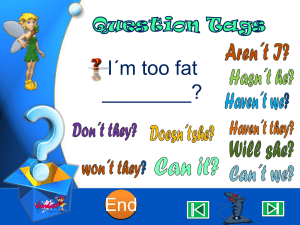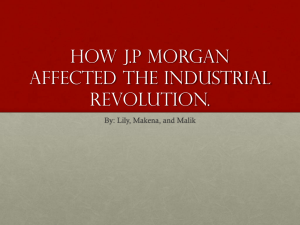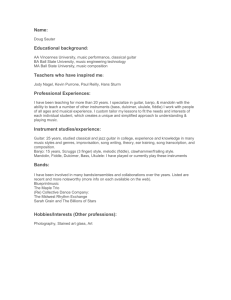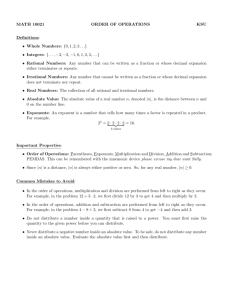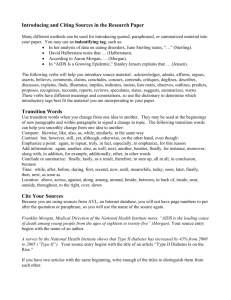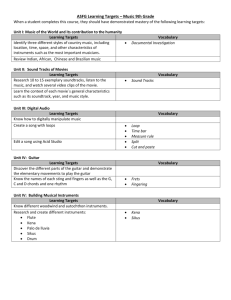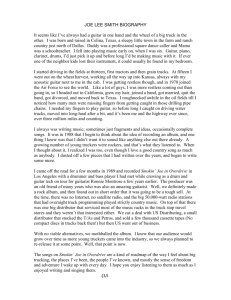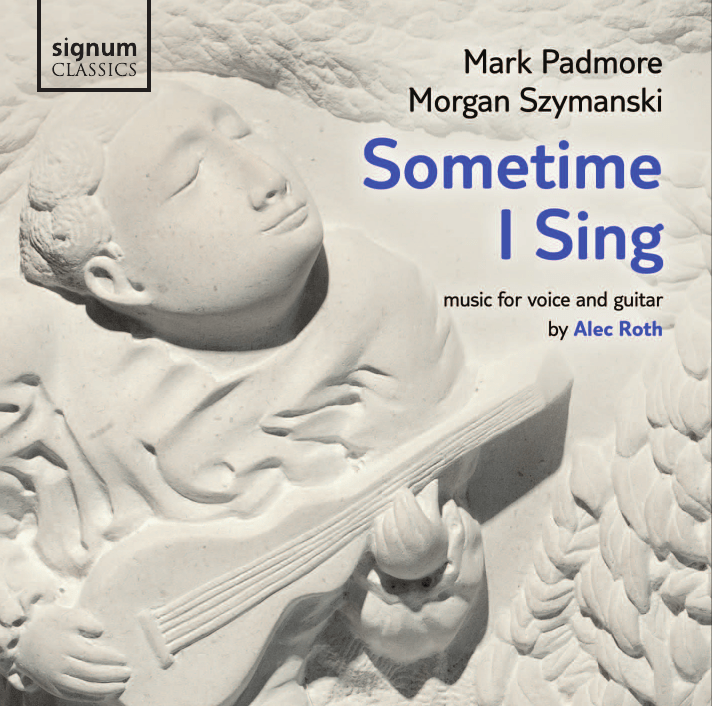
SOMETIME I SING
ALEC ROTH
1
2
3
4
5
6
7
8
9
My Lute and I (Words by Thomas Wyatt)
I. Sigh and Moan
II. Tell Me
III. How?
IV. A Kiss
V. Wonders
VI. Out of My Mind
VII. Tangled
VIII. Sometime I Sing
IX. Now Cease
[2.33]
[2.41]
[3.48]
[1.28]
[3.06]
[3.11]
[3.11]
[3.31]
[4.22]
0 Invocation
(guitar solo)
[4.40]
q Dark Night (Words by Vikram Seth)
[4.50]
Three Night Songs (Words by Vikram Seth)
w I. The Gift
e II. Heart
r III. All You Who Sleep Tonight
[3.04]
[3.23]
[1.34]
t Autumnal (Words by John Donne)
[4.01]
English Folk Songs
I. Scarborough Fair
II. The Brisk Young Widow
III. The Turtle Dove
IV. Dance to Your Daddy
V. Sweet William
[2.01]
[2.12]
[3.00]
[1.40]
[2.59]
y
u
i
o
p
a Lights Out (Words by Edward Thomas)
[4.21]
[65.37]
Total timings:
MARK PADMORE TENOR
MORGAN SZYMANSKI GUITAR
www.signumrecords.com
My Lute and I
A song-cycle for tenor and guitar
Words by Thomas Wyatt, Music by Alec Roth
Sigh and Moan; Tell Me; How?; A Kiss; Wonders; Out
of My Mind; Tangled; Sometime I Sing; Now Cease
Oswald wonders if Wyatt staged his own death
in order to live out his life in seclusion with his
last great love, Elizabeth Darrell.
Many of Wyatt’s poems, including most of the nine
selected here, were clearly intended to be sung
(some perhaps even to existing melodies). The
music of the third song (‘How?’) makes use of a
melody adapted from the English folk song
“Searching for Lambs”. The two ‘Wonders’ of the
central song (No. 5) are the legendary magnetic
rock that draws ships to their doom, and the
phoenix, whose rebirth from its own ashes Wyatt
likens to his own capacity for renewal through the
flame of love.
Thomas Wyatt (1503-1542) is now remembered as
a poet, translator and establisher of the sonnet
as an English verse form, but none of his poems
were published in his lifetime. The son of a court
official, he followed his father into the service of
Henry VIII. As a diplomat he travelled widely in
Europe, including to Rome as part of the mission
seeking papal approval for Henry’s divorce. His
services were rewarded by a knighthood in 1535,
but he was never happy with the noise and
intrigue of court life. Falling in love with Anne
Boleyn was not the best of career moves and
Wyatt was lucky to survive imprisonment in the
Tower. His private life was often unsettled,
encompassing a failed marriage and a
succession of mistresses. He died unexpectedly in
1542 on his way to meet a diplomatic mission in
Falmouth, when he stopped off to stay with a
friend, Sir John Horsey in Dorset. Curiously, his
body was not returned to his family, but interred
in the Horsey family tomb in Sherborne Abbey.
In the introduction to her selection of Wyatt’s
verse (Faber & Faber, 2008), the poet Alice
I am most grateful to Dione Digby, whose idea it
was that I might enjoy setting some of Wyatt’s
poems to music. My Lute and I was composed for
Mark Padmore and Morgan Szymanski, and first
performed by them in a recital at the Chapel,
Lulworth Castle, Dorset, on the 13th of July,
2011, as part of the Summer Music Society of
Dorset’s 2011 season of concerts.
-4-
Invocation
For solo guitar
Keen to find out what else he had written, I
discovered a collection of poems, The Humble
Administrator’s Garden. I dashed off a letter to
the author, care of his publisher, politely asking
his permission to set some of them to music. Then
began a process as daunting as the entrance
examinations to the Chinese Imperial Civil
Service. I learned that many composers applied
to set Vikram’s words, but few were chosen. The
first step was for me to submit a sample recording
of some of my existing music. I dispatched a
cassette tape to India. In due course I learned that
my musical style was deemed not unacceptable,
and I was allowed to proceed to the next stage. I
was instructed to set one of Vikram’s poems, and
he would hear the result the next time he was in
London (I didn’t tell him that by then I had
already set some half-dozen). That was how I
found myself in the arrivals hall at Heathrow
Airport, holding up a sign with “Mr Seth” written
in large letters. For me, it was an unforgettable
meeting, and the beginning of one of the most
important artistic collaborations of my musical
life, and a lasting friendship.
This little nocturne was the fourth in a series of
pieces composed for Morgan Szymanski, following
Cat Dances (2002), The Unicorn in the Garden
(2003) and Canción de la Luna (2004). Morgan
gave its first performance in a recital at the
Wigmore Hall, London on 11 October 2005.
Dark Night
For voice and guitar, or harp, or keyboard, or strings
Words by Vikram Seth, Music by Alec Roth
I was introduced to Vikram Seth’s writing on the
21st of August 1987. At that time I was working at
English National Opera. My friend and colleague,
Rebecca Meitlis (then a director at ENO) has a
particular gift for suggesting potential collaborators.
We were taking a walk along the Thames by the
Royal Festival Hall when Rebecca suddenly turned
to me with a question: “Have you read The Golden
Gate?” “What’s that?”, I asked. “Don’t move”, she
said, disappearing, to emerge from the nearby
bookshop some minutes later holding a copy of
Vikram’s novel in verse. I started reading as soon as
I got home, and was soon completely engrossed,
pausing only at stanza 5.39 to jot down some ideas
for a musical setting of these lovely words.
Described by Gore Vidal as “the great Californian
novel”, The Golden Gate derives much of its
charm from the playful tension between the rigid
formality of its verse structure and the everyday
-5-
lives of its colourful cast of characters. ‘Dark
Night’ is one of very few stanzas in the book that
can be taken out of context and stand alone. The
nocturnal theme is common in much of Vikram’s
poetry; here it is the beauty and healing power
of the night which is invoked.
given as part of the Salisbury International
Arts Festival.
It is fitting that this, my very first setting of
words by Vikram Seth, is dedicated (with much
gratitude) to Rebecca Meitlis. The version for voice
and guitar recorded here was made for Mark
Padmore and Morgan Szymanski, and first
performed by them at a Rochdale Music Society
concert given at Rochdale Town Hall, on the 15th
of November 2008.
This song was composed in 2010 as a present to
my friend Lis Woods on the occasion of her 70th
birthday, at the suggestion of her sister-in-law,
the mezzo-soprano Sally Bradshaw, who also
suggested John Donne’s poem ‘The Autumnal’ as
a possible text. It was first sung by Sally at a
private performance on Lis’s birthday. A slightly
shortened version for choir and orchestra is
incorporated into the Cantata A Time to Dance.
John Donne (1572-1631) is thought to have
written ‘The Autumnal’ as a tribute to Lady
Magdalen Herbert, one of a number of poems and
letters which he addressed to his old friend, a
noted patron of writers and mother of the poet
George Herbert.
Autumnal
For voice and guitar, or harp, or keyboard
Words by John Donne, Music by Alec Roth
Three Night Songs
For tenor and guitar
Words by Vikram Seth, Music by Alec Roth
The Gift; Heart; All You Who Sleep Tonight
The first of the three poems set here appeared in
Vikram’s collection The Humble Administrator’s
Garden (Carcanet, 1985), the other two in the
collection All You Who Sleep Tonight (Faber &
Faber, 1990). The Three Night Songs were
composed for Mark Padmore and Morgan
Szymanski, and first performed by them at Wilton
Church, on the 1st of June 2011, at a concert
English Folk Songs
Arranged for voice and guitar by Alec Roth
Scarborough Fair; The Brisk Young Widow; The
Turtle Dove; Dance to Your Daddy; Sweet William
These arrangements for voice and guitar of five
English folk songs were made for Mark Padmore
and Morgan Szymanski. They gave the first
performance at a Rochdale Music Society concert
at Rochdale Town Hall, 15 November 2008.
Lights Out
For tenor and guitar
Words by Edward Thomas, Music by Alec Roth
This setting of one of my favourite poems was
made for Mark Padmore and Morgan Szymanski,
and was first performed by them for this recording.
Like Autumnal, it is also incorporated in the
cantata A Time to Dance in a version for unison
choir and orchestra.
Notes by Alec Roth
-6-
-7-
TEXTS
My Lute and I
Words by Thomas Wyatt (1503-1542)
N.B. The titles of the songs are the composer’s.
Wyatt’s poems are usually identified only by
their first lines.
For cruelty
Most that can be
Hath sovereignty
Within your heart,
Which maketh bare
All my welfare;
Nought do you care
How sore I smart.
For of relief
Since I have none,
My lute and I
Continually
Shall us apply
To sigh and moan.
No tiger’s heart
Is so pervert
Without desert
To wreak his ire;
And you me kill
For my good will:
Lo, how I spill
For my desire!
Ah, Robin, / Hey Robin,
Jolly Robin, / Gentle Robin,
Tell me how thy lady does,
And thou shalt know of mine.
If that be true yet as thou sayest
That women turn their heart,
Then speak better of them thou mayest
In hope to have thy part.
Such folks shall take no harm by love
That can abide their turn;
But I, alas, can no way prove
In love but lack and mourn.
2 Tell Me
1 Sigh and Moan
At most mischief
I suffer grief;
For of relief
Since I have none,
My lute and I
Continually
Shall us apply
To sigh and moan.
There is no love
That can you move
And I can prove
No other way;
Therefore I must
Restrain my lust,
Banish my trust
And wealth away.
Nought may prevail
To weep or wail;
Pity doth fail
In you, alas!
Mourning or moan,
Complaint or none,
It is all one,
As in this case.
Thus in mischief
I suffer grief;
-8-
But if thou wilt avoid thy harm,
Learn this lesson of me:
At other fires thy self to warm,
And let them warm with thee.
My lady is unkind, perde!
Alas, why is she so?
She loveth another better than me,
And yet she will say no.
3 How?
How should I
Be so pleasant
In my semblance
As my fellows be?
I find no such doubleness;
I find women true.
My lady loveth me doubtless,
And will change for no new.
Not long ago
It chanced so
As I did walk alone
I heard a man
That now and than
Himself did thus bemoan:
Thou art happy while that doth last,
But I say as I find:
That women’s love is but a blast
And turneth like the wind.
-9-
Alas (he said)
I am betrayed
And utterly undone;
Whom I did trust
And think so just
Another man hath won.
Where is the oath,
Where is the troth
That she to me did give?
Such fained words
With silly bawds
Let no wise man believe.
5 Wonders
My service due
And heart so true
On her I did bestow;
I never meant
For to repent
In wealth nor yet in woe.
For even as I
Thus woefully
Unto myself complain,
If ye then trust
Needs learn ye must
To sing my song in vain:
For unto that that men may see
Most monstrous thing of kind,
My self may best compared be;
Love hath me so assigned.
Love did assign
Her to be mine
And not to love none new;
But who can bind
Their fickle kind
That never will be true?
How should I
Be so pleasant
In my semblance
As my fellows be?
The western wind
Hath turned her mind
And blown it clean away;
Thereby my wealth,
My mirth and health
Are driven to great decay.
Alas, madam, for stealing of a kiss
Have I so much your mind there offended?
Have I then done so grievously amiss
That by no means it may be amended?
Then revenge you; and the next way is this:
Another kiss shall have my life ended,
For to my mouth the first my heart did suck;
The next shall clean out of my breast it pluck.
4 A Kiss
- 10 -
The flame whereof doth aye repair
My life when it is gone.
Will ye see what wonders love hath wrought?
Then come and look at me;
There need no where else to be sought,
In me ye may them see.
6 Out of My Mind
Shall she never out of my mind,
Nor shall I never out of this pain,
Alas her love doth me so blind,
Except her help I am now slain.
I never told her of my mind,
What pain I suffer for her sake:
Alas! what means might I now find
That no displeasure with me she take.
There is a rock in the salt flood,
A rock of such nature
That draweth the iron from the wood
And leaveth the ship unsure.
If I speak fair, she says I flatter,
And if I dare not I shall not speed.
If I to her do write a letter,
Then will she say she cannot read.
She is the rock, the ship am I;
That rock my deadly foe,
That draweth me there where I must die,
And robbeth my heart me fro.
Shall I despair yet for all this?
Nay, nay, my heart will not do so.
I would once my sweetheart kiss,
A thousand times to bind more woe.
A bird there flyeth, and that but one,
Of her this thing ensueth,
That when her days be spent and gone,
With fire she reneweth.
I am abashed when I should speak.
Alas! I cannot my mind express.
It maketh my heart in pieces break
To see her loving gentleness.
And I with her may well compare
My love that is alone
- 11 -
Was never bird tangled in lime,
That broke away in better time,
Than I, that rotten boughs did climb,
And had no hurt, but scaped free.
Now ha, ha, ha, full well is me,
For I am now at liberty.
7 Tangled
Tangled I was in love’s snare,
Oppressed with pain, torment with care,
Of grief right sure, of joy full bare,
Clean in despair by cruelty;
But ha, ha, ha, full well is me,
For I am now at liberty.
8 Sometime I Sing
Sometime I sigh, sometime I sing,
Sometime I laugh, sometime mourning,
As one in doubt this is my saying:
Have I displeased you in anything?
The woeful days so full of pain,
The weary nights all spent in vain,
The labour lost for so small gain,
To write them all it will not be;
But ha, ha, ha, full well is me,
For I am now at liberty.
When you are merry, then I am glad;
When you are sorry, then I am sad;
I will you love; I will not spare
Into your presence as far as I dare.
Everything that fair doth show,
When proof is made it proveth not so,
But turneth mirth to bitter woe,
Which in this case I full well see;
But ha, ha, ha, full well is me,
For I am now at liberty.
All my poor heart and my love true
While life doth last I give to you;
And you to serve with service due,
And never to change you for no new.
With fained words which were but wind
To long delays I was assigned;
Her wily looks my wits did blind;
Thus as she would I did agree.
But ha, ha, ha, full well is me,
For I am now at liberty.
9 Now Cease
My lute, awake! Perform the last
Labour that thou and I shall waste,
And end that I have now begun;
- 12 -
For when this song is sung and past,
My lute be still, for I have done.
To cause thy lovers sigh and swoon;
Then shalt thou know beauty but lent,
And wish and want as I have done.
As to be heard where ear is none,
As lead to grave in marble stone,
My song may pierce her heart as soon.
Should we then sigh, or sing, or moan?
No, no, my lute, for I have done.
Now cease, my lute; this is the last
Labour that thou and I shall waste,
And ended is that we begun.
Now is this song both sung and past;
My lute, be still, for I have done.
The rocks do not so cruelly
Repulse the waves continually
As she my suit and affection,
So that I am past remedy,
Whereby my lute and I have done.
q Dark Night
Words by Vikram Seth (The Golden Gate, 5.39)
Dark night and silent, calm, and lovely,
That stills the efforts of our lives,
Rare, excellent-kind, and behovely . . .
No matter how the poet strives
To weave with epithets and clauses
Your soundless web, he falters, pauses,
And your enchantment slips between
His hands, as if it’s never been.
Of all times most imbued with beauty,
You lend us by your spell relief
From ineradicable grief
(If for a spell), and pain, and duty.
We sleep, and nightly are made whole
In all our fretted mind and soul.
Vengeance shall fall on thy disdain
That makest but game on earnest pain;
Think not alone under the sun
Unquit to cause thy lovers plain,
Although my lute and I have done.
Perchance thee lie withered and old,
The winter nights that are so cold,
Plaining in vain unto the moon;
Thy wishes then dare not be told.
Care then who list, for I have done.
And then may chance thee to repent
The time that thou hast lost and spent
- 13 -
Three Night Songs
words by Vikram Seth
e II. Heart
I wake at three, in some slight pain.
I hear no sound of clock or rain,
No chorus of the stars, no gong,
Mosquito, siren, horn or plane.
w I. The Gift
Awake, he recalls
The district of his sleep.
It was desert land,
The dunes gold, steep,
Warm to the bare foot, walls
Of pliant sand.
Only my heart beats slow and strong.
I listen to its certain song.
It does not sympathize but strives
To beat all night and all day long.
Someone, was he a friend?,
Placed a stone of jade
In his hand
And, laughing, said
“When this comes to an end
You will not understand.”
He is awake, yet through
The ache of light
He longs to dream again.
He longs for night,
The contour of the sand, the rendezvous,
The gift of jade, of sight.
In all her words, unto all hearers fit,
You may at revels, you at council, sit.
If we love things long sought, age is a thing
Which we are fifty years in compassing;
If transitory things, which soon decay,
Age must be loveliest at the latest day.
t Autumnal
Words from “The Autumnal”
by John Donne (1572-1631)
English Folk Songs
No spring nor summer beauty hath such grace
As I have seen in one autumnal face.
y I. Scarborough Fair
Whether my spirit soars or dives,
My blood, at its compulsion, drives
Through its elastic chambers, through
My arteries, my veins, my lives.
Young beauties force our love, and that’s a rape,
This doth but counsel, yet you cannot scape.
If ’twere a shame to love, here ’twere no shame;
Affection here takes reverence’s name.
Where are you going? To Scarborough Fair?
(Parsley, sage, rosemary and thyme)
Remember me to a bonny lass there,
For once she was a true lover of mine.
Above all, to my heart I’m true.
It does not tell me what to do.
It beats, I live, it beats again.
For what? I wish I knew it knew.
Were her first years the golden age? That’s true,
But now she’s gold oft tried and ever new.
That was her torrid and inflaming time,
This is her tolerable tropic clime.
Tell her to plough me an acre of land,
(Parsley, sage, rosemary and thyme)
Between the sea and the salt sea strand,
And she shall be a true lover of mine.
r III. All You Who Sleep Tonight
This is Love’s timber, youth his underwood;
There he, as wine in June, enrages blood,
Which then comes seasonabliest when our taste
And appetite to other things is past.
Tell her to plough it with one ram’s horn,
(Parsley, sage, rosemary and thyme)
And sow it all over with one peppercorn,
And she shall be a true lover of mine.
Here where still evening is, not noon nor night,
Where no voluptuousness, yet all delight.
Tell her to reap it with a sickle of leather,
(Parsley, sage, rosemary and thyme)
All you who sleep tonight
Far from the ones you love,
No hand to left or right,
And emptiness above –
- 14 -
Know that you aren’t alone.
The whole world shares your tears,
Some for two nights or one,
And some for all their years.
- 15 -
And tie it all up with a tomtit’s feather,
And she shall be a true lover of mine.
Tell her to gather it all in a sack,
(Parsley, sage, rosemary and thyme)
And carry it home on a butterfly’s back,
And then she shall be a true lover of mine.
u II. The Brisk Young Widow
In Chester town there lived a brisk young widow.
For beauty and fine clothes, none could excel her.
She was proper stout and tall,
her fingers long and small.
She’s a comely dame withal.
She’s a brisk young widow.
Says she: “I’m not for you, nor no such fellow.
I’m for a lively lad with land and riches.
It’s not your hogs and yows
can maintain furbelows.
My silk and satin clothes are all my glory”.
As fair thou art my bonny lass,
So deep in love am I.
But I never will prove false to the bonny lass I love,
Till the stars fall from the sky, my dear,
Till the stars fall from the sky.
“O Madam don’t be coy, for all your glory,
For fear of another day and another story.
If the world on you should frown,
your topknot must come down
To a linsey-woolsey gown.
Where is then your glory?”
The sea will never run dry, my dear,
Nor the rocks never melt with the sun.
But I never will prove false to the bonny lass I love,
Till all these things be done, my dear,
Till all these things be done.
At last there came that way a sooty collier,
With his hat bent down all round;
he soon did gain her.
Whereat the farmer swore:
“The widow’s crazed, I’m sure!
And I’ll never court no more a brisk young widow”.
A lover soon there came, a brisk young farmer,
With his hat turned up all round,
thinking to gain her:
“My dear, for love of you,
this wide world I’ll go through,
If you will but prove true,
you shall wed a farmer”.
i III. The Turtle Dove
Fare you well, my dear, I must be gone
And leave you for a while.
If I roam away I’ll come back again,
Though I roam ten thousand miles, my dear,
Though I roam ten thousand miles.
- 16 -
Dance to your daddy, my little laddie,
Dance to your daddy, my little man.
When thou art a man and fit to take a wife,
Thou shalt wed a maid and love her all your life.
She shall be your lassie, thou shalt be her man.
Dance to your daddy, my little lamb.
Dance to your daddy, my little laddie,
Dance to your daddy, my little man.
p V. Sweet William
O yonder doth sit that little turtle dove,
He doth sit on yonder high tree,
A-making a moan for the loss of his love,
As I will do for thee my dear,
As I will do for thee.
A sailor’s life is a merry life.
He’ll rob young girls of their heart’s delight,
Then go and leave them to sigh and moan.
No tongue can tell when he will return.
o IV. Dance to Your Daddy
Dance to your daddy, my little laddie,
Dance to your daddy, my little man.
“O father, father, build me a boat,
That on the ocean I may float,
And the first king’s ship that I chance to meet,
I will enquire for my William sweet.”
Thou shalt have a fish, thou shalt have a fin,
Thou shalt have a haddock when the boat comes in.
Thou shalt have a codling boiled in a pan.
Dance to your daddy, my little man.
She had not sailed far on the deep
Before a king’s ship she chanced to meet.
“O all you sailors, come tell me true,
Is my sweet William on board with you?”
- 17 -
“O no, fair lady, he is not here,
For he is drowned, I greatly fear,
On yonder island as we passed by,
There we lost sight of your sailor boy.”
Suddenly now blurs,
And in they sink.
Here love ends,
Despair, ambition ends;
All pleasure and all trouble,
Although most sweet or bitter,
Here ends in sleep that is sweeter
Than tasks most noble.
She kneeled down and she wrote a song.
She wrote it neat and she wrote it long.
At every line, O, she shed a tear,
And at the end: “Fare you well, my dear”.
The grass it groweth on every lea.
The leaf it falleth from every tree.
How happy that small bird doth cry
That hath her true love close to her side.
There is not any book
Or face of dearest look
That I would not turn from now
To go into the unknown
I must enter, and leave, alone,
I know not how.
a Lights Out
Words by Edward Thomas (1878-1917)
The tall forest towers;
Its cloudy foliage lowers
Ahead, shelf above shelf;
Its silence I hear and obey
That I may lose my way
And myself.
I have come to the borders of sleep,
The unfathomable deep
Forest where all must lose
Their way, however straight,
Or winding, soon or late;
They cannot choose.
Many a road and track
That, since the dawn’s first crack,
Up to the forest brink,
Deceived the travellers,
© Andrew Mellor
- 18 -
- 19 -
ALEC ROTH
Born near Manchester, of German/Irish descent,
Alec Roth studied music at the University of
Durham, and gamelan at the Academy of
Indonesian Performing Arts (ASKI) in Surakarta,
Central Java. From 1986 to 1989 he was holder
of the Collard Fellowship, and in 2000 received
a major grant to further his composition work
from the Gulbenkian Foundation. Posts he has
held include Founder/Artistic Director of the
Royal Festival Hall Gamelan Programme and
Southbank Gamelan Players; Music Director of
the Baylis Programme at English National Opera;
and Composer in Association, Opera North. He now
works as a freelance composer.
Alec Roth’s collaborations with the Indian writer
Vikram Seth include the song cycles Chinese
Gardens (Chester Festival commission) and
Romantic Residues (Bury St Edmunds Festival
commission) and Earth and Sky for children’s
chorus (BBC commission for the Proms 2000
season). Vikram Seth was also the librettist for
Arion and the Dolphin, commissioned by English
National Opera and premiered in the Royal Navy
Dockyard, Plymouth in 1994.
Other works include a version of Shakespeare’s
The Tempest with gamelan; Gretel and Hansel,
an opera for young people, libretto by David Sulkin;
The Big Wash Cycle, songs to words by Jo Shapcott;
All Summer in a Day, a musical drama for children
to perform to adults, based on the story by Ray
Bradbury; and four commissions for the Academy
of St Martin in the Fields: Departure of the Queen
of Sheba for oboe, cor anglais and string orchestra;
Nocturne for viola and string orchestra; Concertino
Piccolo for string orchestra with two groups of
young violinists; and Concerto for Guitar and
String Orchestra. The concerto was for the Mexican
guitarist Morgan Szymanski for whom he has also
composed a Quintet and numerous solo works.
Between 2006 and 2009 he completed The Rivered
Earth, a sequence of four major works – Songs
in Time of War; Shared Ground; The Traveller;
Seven Elements – created in collaboration
with Vikram Seth and violinist Philippe Honoré,
co-commissioned by the Salisbury, Chelsea and
Lichfield Festivals. Vikram’s book The Rivered
Earth (Penguin 2011) tells the story of the project,
including an account of “the pleasures and pains
of working with a composer”.
Recent works include Earthrise for unaccompanied
choir in 40 parts, commissioned to celebrate the
- 20 -
© Helen Smith
40th anniversary of Jeffrey Skidmore’s choir Ex
Cathedra; the song-cycle My Lute and I – the
latest in a series of works composed for the
tenor Mark Padmore; A Time to Dance, a cantata
for soloists, choir and orchestra, commissioned
to celebrate the 50th anniversary of the Summer
Music Society of Dorset; and Old Earth, a
music-theatre piece, words by Samuel Beckett,
for actor (Alan Howard) and unaccompanied
- 21 -
choir (Harry Christophers and The Sixteen),
commissioned by the Spitalfields Festival.
In November 2012, the anthem Jubilate,
commissioned by the Musicians Benevolent
Fund for the annual Festival of St Cecilia,
was given its first performance at St Paul’s
Cathedral by the combined Choirs of St Paul’s,
Westminster Abbey and Westminster Cathedral.
MARK PADMORE
Tenor Mark Padmore was born in London and
grew up in Canterbury. After beginning his
musical studies on the clarinet he gained a choral
scholarship to King’s College, Cambridge and
graduated with an honours degree in music.
He has established a flourishing career in
opera, concert and recital. His performances in
Bach’s Passions have gained particular notice
throughout the world. In the opera house he has
worked with directors Peter Brook, Katie Mitchell,
Mark Morris and Deborah Warner. Recent work
includes the leading role in Harrison Birtwistle’s
new opera The Corridor with performances at
the 2009 Aldeburgh and Bregenz Festivals, as
well as the Southbank Centre in London; Tom
Rakewell in Stravinsky The Rake’s Progress at
La Monnaie, Brussels; Handel Jephtha at WNO
and ENO and the Evangelist in a staging of
St Matthew Passion at Glyndebourne. He also
played Peter Quint in an acclaimed BBC TV
production of Britten Turn of the Screw and
recorded the title role in La Clemenza di Tito
with René Jacobs for Harmonia Mundi. Future
plans include Captain Vere in Britten Billy Budd
for Glyndebourne Festival Opera.
- 22 -
In concert he has performed with many of
the world’s leading orchestras including the
Munich Radio, Berlin, Vienna, New York and
London Philharmonic Orchestras, the Royal
Concertgebouw Orchestra, Boston and London
Symphony Orchestras and the Philharmonia.
He makes regular appearances with the OAE
with whom he has conceived projects exploring
both Bach St John and St Matthew Passions.
Mark has given recitals in Amsterdam, Barcelona,
Brussels, Madrid, Milan, Moscow, New York
Paris and Vienna. He appears frequently at
Wigmore Hall in London where he first sang all
three Schubert song cycles in May 2008, was
their Artist in Residence in the 2009/10
Season and in 2011-2012 repeated the cycles
there with Paul Lewis. He also recently sang
the cycles at the Theatre an der Wien and at
Salle Gaveau in Paris with Till Fellner. Composers
who have written for him have included
Mark-Anthony Turnage, Alec Roth, Sally Beamish,
Thomas Larcher and Huw Watkins. As well as
his regular collaborators Paul Lewis, Till Fellner,
Kristian Bezuidenhout, Julius Drake, Roger
Vignoles, Simon Lepper and Andrew West, he
works with many internationally renowned
chamber musicians including Imogen Cooper
and Steven Isserlis.
© Marco Borggreve
He has made many recordings including the
Bach passions with Herreweghe and McCreesh,
Bach cantatas with Eliot Gardiner and
Herreweghe, Haydn masses with Richard Hickox,
Don Giovanni with Daniel Harding and operas by
Rameau and Charpentier with William Christie.
A disc of Handel arias As Steals the Morn with
The English Concert and Andrew Manze,
released by Harmonia Mundi, won the BBC Music
Magazine Vocal Award in April 2008. Other recent
releases include Haydn Creation for Deutsche
- 23 -
Grammophon; Messiah with Sir Colin Davis and
the LSO; Britten Winter Words with Roger Vignoles;
Schubert Schwanengesang, Die Schöne Müllerin
and Winterreise with Paul Lewis for Harmonia
Mundi, which won the Gramophone magazine Vocal
Solo Award for 2010 and Schumann Dichterliebe
with Kristian Bezuidenhout which won the Vocal
Solo category of the 2011 Edison Klassiek Award.
Mark is Artistic Director of the St. Endellion
Summer Music Festival in Cornwall.
Described as ‘a player destined for future glories’
(Classical Guitar Magazine) Morgan Szymanski
has been highlighted as ‘One to Watch’ by
both Gramophone Magazine and BBC Music
Magazine. A featured artist on the cover of
Classical Guitar Magazine, Morgan Szymanski
was recently selected as a finalist for the
‘Outstanding Young Artist Award’ by MIDEM
Classique/IAMA.
Born in Mexico City in 1979, Morgan Szymanski
started playing the guitar at the age of six. Early
studies at the National Music School (Mexico) and
the Edinburgh Music School led to a scholarship
to study under Carlos Bonell and Gary Ryan at
the Royal College of Music (RCM) in London,
graduating in 2004 with first class honours.
During his studies he won all guitar prizes from the
RCM as well as scholarships from the Tillett Trust,
Countess of Munster Musical Trust, Leverhulme
Trust, Wall Trust, FONCA and a scholarship to
study at the Conservatorium van Amsterdam. He
immediately went on to become the first solo
guitarist to be selected by Young Classical
Artist Trust and was the first guitarist to be
awarded a Junior Fellowship at the RCM, where
he completed his Masters with distinction.
- 24 -
A top prize-winner at international competitions,
in 2002 Morgan won first prize at the National
Guitar Competition in Mexico. Performances as a
soloist and with orchestras have taken him to
concert halls and festivals in Argentina, Austria,
Belgium, Bermuda, China, Chile, France, Germany,
Guatemala, Holland, Ireland, Italy, Luxembourg,
Mexico, Macedonia, Portugal, Spain, Switzerland,
Scotland, UK, USA and Zimbabwe. In recent years
Morgan has given recitals at major UK venues
and festivals including at the Wigmore Hall,
Cadogan Hall, Bridgewater Hall, Purcell Room,
Queen Elizabeth Hall, Kings Place, The Sage
Gateshead, Royal Opera House, Lichfield Festival,
Salisbury Festival and London International
Guitar Festival. He has appeared as a soloist
with the Royal Philharmonic Orchestra, Hallé,
Northern Sinfonia, Orchestra of the Swan,
Southbank Sinfonia, the Welsh Chamber
Orchestra, Scottish Sinfonia, the Cervantes Choir
and the Academy of St. Martin in the Fields.
Morgan’s devotion to chamber music has led to
collaborations with artists such as John Williams
and Carlos Bonell (guitar), Mark Padmore (tenor),
Alison Balsom (trumpet), Priya Mitchell (violin),
Marcelo Nisinman (bandoneon), the Sacconi
Quartet, Phuong Nguyen (accordion), Adam Walker
(flute) and Clara Mouriz (mezzo-soprano)
amongst others.
Regularly broadcast live on TV and radio
worldwide, Morgan can often be heard on BBC
Radio 3. Described as ‘top class in every respect’
(Classical Guitar Magazine, 2005), Morgan’s first
CD ‘The Unicorn in the Garden’, was released in
2005 including works by Iannarelli, Ritter, Ponce
and Barrios as well as works especially written
for him by Alec Roth. His recordings with his
ensemble Machaca, ‘Mano a Mano’ and ‘Los
Ambulantes’ on Sarabande Records, have been
described as ‘a jewel’ by Gramophone Magazine.
Morgan’s latest project is a visual and auditory
journey entitled ‘Sketches of Mexico’. Released
on Sarabande, this is a unique collaboration
combining Mexican music from Julio César Oliva
and Manuel M. Ponce and the work of twenty
visual artists from the UK, Mexico, Portugal and
China. Gramophone Magazine has called it ‘a
gorgeous and original tribute to Szymanski’s
homeland, its artists and its music’ with Morgan’s
playing ‘of the highest order.’
The season 2012/13 sees Morgan return to Morelia
Festival and the Wigmore Hall amongst other
performances and tours across the UK, Mexico,
Chile, China and Spain.
© Ben Crawford
MORGAN SZYMANSKI
Morgan Szymanski plays on a Yulong Guo Guitar,
supplied by the London Guitar Studio
- 25 -
© Andrew Mellor
This CD is dedicated to John West (1950-2013) in memoriam
Recorded in St Alban’s Church, Holborn, 16-18 November 2011
Producer - John West
Recording Engineers - Mike Hatch and Andrew Mellor
Cover Image - Ana Maria Pacheco, As proezas de Macunaíma (1),
Portland Stone Relief (detail) © Pratt Contemporary
Design and Artwork - Woven Design
www.wovendesign.co.uk
Booklet Notes - © Alec Roth
Song Texts ‘Dark Night’; ‘The Gift’; ‘Heart’; ‘All You Who Sleep Tonight’ - © Vikram Seth
P 2013 Alec Roth
© 2013 The copyright in this CD booklet, notes and design is owned by Signum Records Ltd.
Any unauthorised broadcasting, public performance, copying or re-recording of Signum Compact Discs constitutes an infringement of copyright and will
render the infringer liable to an action by law. Licences for public performances or broadcasting may be obtained from Phonographic Performance Ltd.
All rights reserved. No part of this booklet may be reproduced, stored in a retrieval system, or transmitted in any form or by any means, electronic,
mechanical, photocopying, recording or otherwise, without prior permission from Signum Records Ltd.
SignumClassics, Signum Records Ltd., Suite 14, 21 Wadsworth Road, Perivale, Middx UB6 7JD, UK.
+44 (0) 20 8997 4000 E-mail: info@signumrecords.com
www.signumrecords.com
- 26 -
- 27 -
ALSO AVAILABLE
on signumclassics
Alec Roth • Vikram Seth: Songs in Time of War
Mark Padmore tenor Philippe Honoré violin
Alison Nicholls harp Morgan Szymanski guitar
Alec Roth • Vikram Seth: Shared Ground
Ex Cathedra, Jeffrey Skidmore
SIGCD270
SIGCD124
“Padmore’s clean tenor finds an ideal vehicle ... there’s a
transparent, haunting beauty about it, and the accompaniments for
violin, harp and guitar are a joy.”
The Times ★★★★
“There’s a lot of important and stimulating music here - all
recorded for the first time - and, without exception, the
performances are fully worthy of the music.”
Musicweb International
Available through most record stores and at www.signumrecords.com For more information call +44 (0) 20 8997 4000


